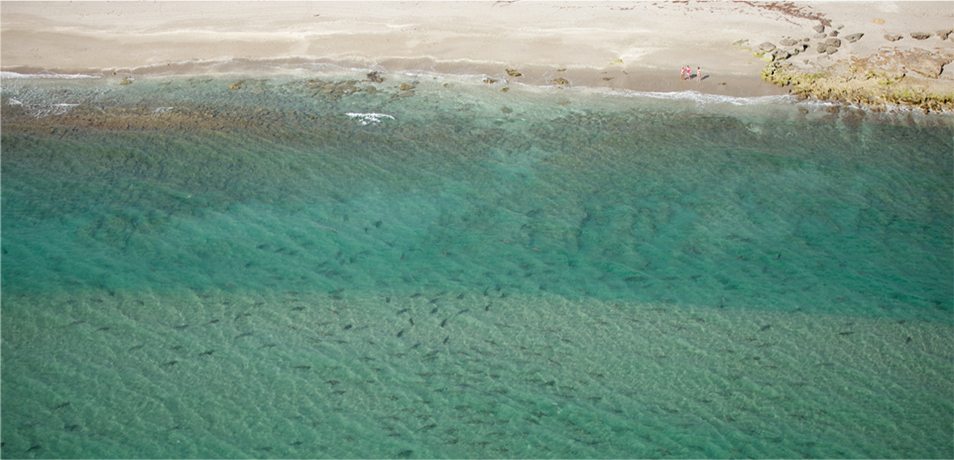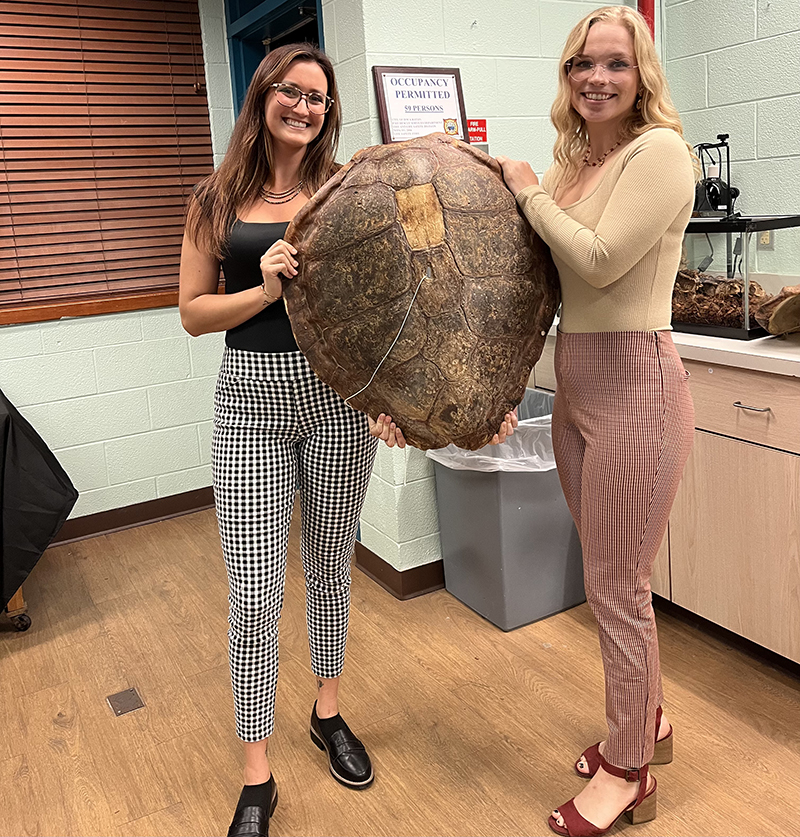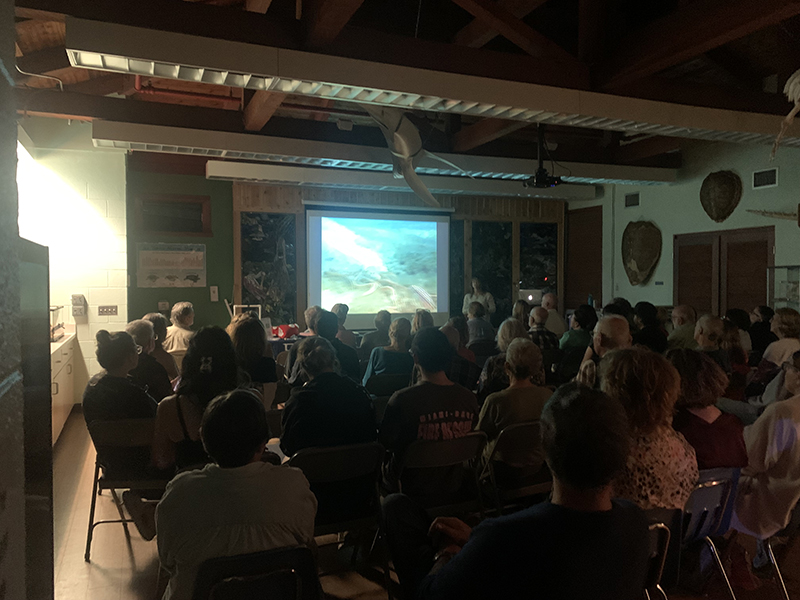
Author: Alex Hoey
Date: March 17, 2024
Gumbo Limbo Nature Center, neighbor of the FAU Marine Lab, hosts an EcoWatch Lecture Series each spring before sea turtle nesting season starts in full swing. In the lineup this season were several friends of the Marine Lab, including SEA Scholars alumni, our Postdoctoral Fellow, and faculty. Let’s dive in!
 Emma Pawlik and Allison Ragle, alumni of the Glenn W. and Cornelia T. Bailey Marine SEA (Science, Education, and Arts) Scholars program and currently part of the team of Gumbo Limbo Nature Center’s Marine Turtle Specialists (MTS), monitor the five miles of Boca Raton beaches each morning from March through October looking for sea turtle nests. The MTS conservation team is often the first to observe signs of nesting activity, so if patterns in nesting emerge, especially in response to human activity, MTS will notice them! Before the start of nesting season in 2023, about a one-mile stretch of the beach was renourished. Renourishment involves relocating sand from offshore onto the beach to combat erosion and maintain important dune structures. However, throughout the season, the conservation team noticed that loggerhead nests were laid closer to the waterline in the renourished site compared to nearby undisturbed beach sections. This can pose a problem, as tides can more easily flood nests closer to the water or remove enough sand to expose eggs, both of which can be fatal for developing embryos. This observation was backed up by data in post-nesting season analysis: During the first three months after the project was completed, female loggerheads were significantly more likely to nest closer to the ocean in the renourished zone than in the undisturbed control zone. As a result, nests in the renourished zone were around 4.5% more likely to get washed out, impacting the hatching and emergence success of those nests. This effect represents an important impact on nesting beach productivity when considering future beach renourishment projects.
Emma Pawlik and Allison Ragle, alumni of the Glenn W. and Cornelia T. Bailey Marine SEA (Science, Education, and Arts) Scholars program and currently part of the team of Gumbo Limbo Nature Center’s Marine Turtle Specialists (MTS), monitor the five miles of Boca Raton beaches each morning from March through October looking for sea turtle nests. The MTS conservation team is often the first to observe signs of nesting activity, so if patterns in nesting emerge, especially in response to human activity, MTS will notice them! Before the start of nesting season in 2023, about a one-mile stretch of the beach was renourished. Renourishment involves relocating sand from offshore onto the beach to combat erosion and maintain important dune structures. However, throughout the season, the conservation team noticed that loggerhead nests were laid closer to the waterline in the renourished site compared to nearby undisturbed beach sections. This can pose a problem, as tides can more easily flood nests closer to the water or remove enough sand to expose eggs, both of which can be fatal for developing embryos. This observation was backed up by data in post-nesting season analysis: During the first three months after the project was completed, female loggerheads were significantly more likely to nest closer to the ocean in the renourished zone than in the undisturbed control zone. As a result, nests in the renourished zone were around 4.5% more likely to get washed out, impacting the hatching and emergence success of those nests. This effect represents an important impact on nesting beach productivity when considering future beach renourishment projects.
 Dr. Chelsea Bennice is a Postdoctoral Fellow in the FAU Marine Lab, guiding and mentoring GW&CTB SEA Scholars and conducting her own research. Dr. Bennice has spent over 1,000 hours underwater studying octopuses. Her lecture was three-fold: octopus behavior, skin bacteria, and arm flexibility! She discovered that two species of octopus, the common octopus and the Atlantic longarm octopus, can coexist near one another in the Lake Worth Lagoon, because they specialize in different prey items, live in different microhabitats, and have different activity periods. Their different behaviors and diets allow each octopus species to fill a distinct niche and reduce competition. Dr. Bennice’s current study is the first to identify and characterize the skin microbiomes (community of bacteria) of each species, finding that that they differ both from one another as well as their environment. These communities may contain both pathogenic and non-pathogenic bacteria that may play an important role as natural defenses against environmental stressors and disease. Finally, Dr. Bennice shared a collaborative research project with Marine Biological Laboratory scientists at Woods Hole, centered on defining the flexibility of octopus arms. Octopuses can perform multiple actions with a single arm and use different arms for many varying actions simultaneously—the ultimate multitasker! Scientists are looking to the octopus as bioinspiration for soft robotics. Dr. Bennice’s lecture was the full run-down on octopuses (yes, that’s the correct plural) we’ve always wanted!
Dr. Chelsea Bennice is a Postdoctoral Fellow in the FAU Marine Lab, guiding and mentoring GW&CTB SEA Scholars and conducting her own research. Dr. Bennice has spent over 1,000 hours underwater studying octopuses. Her lecture was three-fold: octopus behavior, skin bacteria, and arm flexibility! She discovered that two species of octopus, the common octopus and the Atlantic longarm octopus, can coexist near one another in the Lake Worth Lagoon, because they specialize in different prey items, live in different microhabitats, and have different activity periods. Their different behaviors and diets allow each octopus species to fill a distinct niche and reduce competition. Dr. Bennice’s current study is the first to identify and characterize the skin microbiomes (community of bacteria) of each species, finding that that they differ both from one another as well as their environment. These communities may contain both pathogenic and non-pathogenic bacteria that may play an important role as natural defenses against environmental stressors and disease. Finally, Dr. Bennice shared a collaborative research project with Marine Biological Laboratory scientists at Woods Hole, centered on defining the flexibility of octopus arms. Octopuses can perform multiple actions with a single arm and use different arms for many varying actions simultaneously—the ultimate multitasker! Scientists are looking to the octopus as bioinspiration for soft robotics. Dr. Bennice’s lecture was the full run-down on octopuses (yes, that’s the correct plural) we’ve always wanted!
Last, but certainly not least, Dr. Stephen Kajiura is a FAU professor of Biological Sciences and Principal Investigator at the Marine Lab. He studies sharks and rays, and one of his projects centers on understanding the significance of the blacktip shark migration. During his EcoWatch lecture, he provided attendees with highlights and updates! Every winter, blacktip sharks aggregate by the thousands in southeast Florida before migrating northward up the eastern seaboard. Blacktips occupy shallow waters around coral reefs and feed primarily on tropical reef fishes and cephalopods, such as squids and octopuses. They are essential seasonal predators for our reefs, exerting population control that balances the food web. Dr. Kajiura and his team have been studying these movements for over a decade, using a diverse range of monitoring techniques that include aerial surveys using airplanes and drones, underwater video monitoring, and satellite tags on sharks themselves. These observations have documented that the sharks have shifted their distribution farther north in response to warming ocean temperatures in our sub-tropical latitudes. If this trend continues, southeast Florida may be deprived of the “overwintering” aggregation of these predators, as well as their important ecological effects on reef communities.
Gumbo Limbo’s EcoWatch Lecture Series continues through April. Check out the last lecturer of the season, FAU Marine Lab alumna and founder of the Florida Manta Project, Jessica Pate!